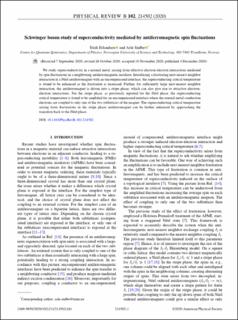Schwinger boson study of superconductivity mediated by antiferromagnetic spin fluctuations
Peer reviewed, Journal article
Published version
Permanent lenke
https://hdl.handle.net/11250/2725704Utgivelsesdato
2020Metadata
Vis full innførselSamlinger
- Institutt for fysikk [2677]
- Publikasjoner fra CRIStin - NTNU [37703]
Originalversjon
10.1103/PhysRevB.102.214502Sammendrag
We study superconductivity in a normal metal, arising from effective electron-electron interactions mediated by spin fluctuations in a neighboring antiferromagnetic insulator. Introducing a frustrating next-nearest neighbor interaction in a Néel antiferromagnet with an uncompensated interface, the superconducting critical temperature is found to be enhanced as the frustration is increased. Further, for sufficiently large next-nearest neighbor interaction, the antiferromagnet is driven into a stripe phase, which can also give rise to attractive electronelectron interactions. For the stripe phase, as previously reported for the Néel phase, the superconducting critical temperature is found to be amplified for an uncompensated interface where the normal metal conduction electrons are coupled to only one of the two sublattices of the magnet. The superconducting critical temperature arising from fluctuations in the stripe phase antiferromagnet can be further enhanced by approaching the transition back to the Néel phase.
